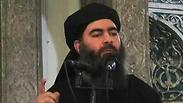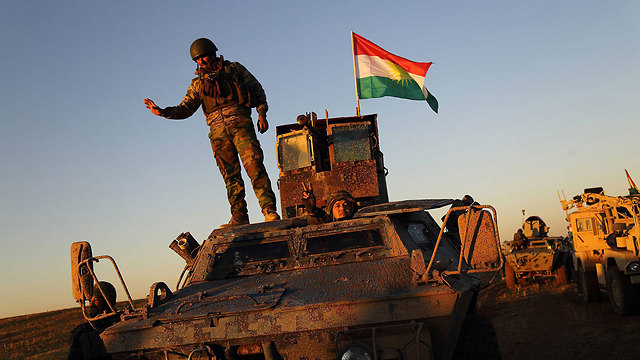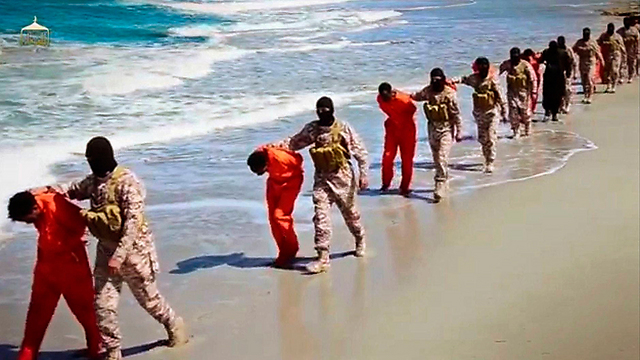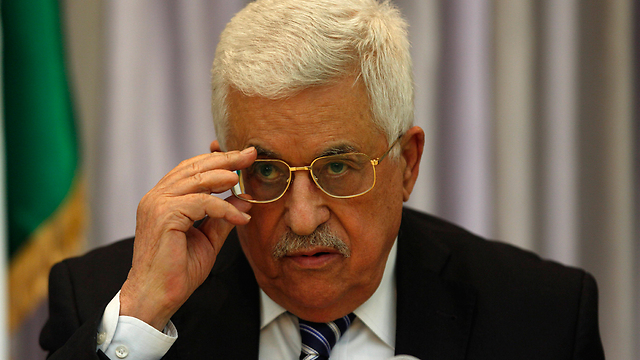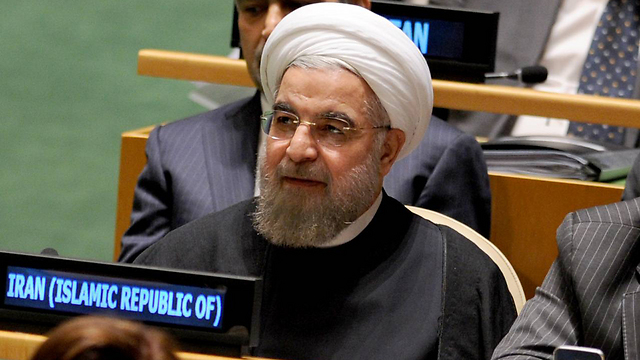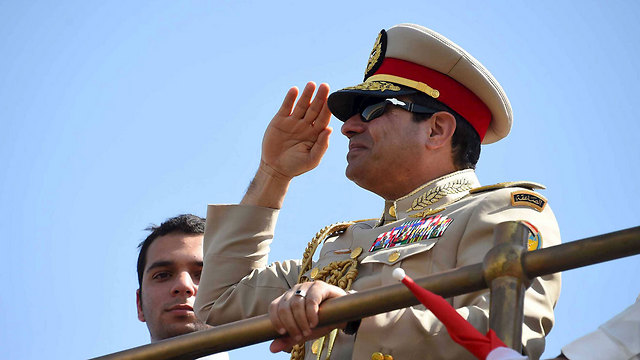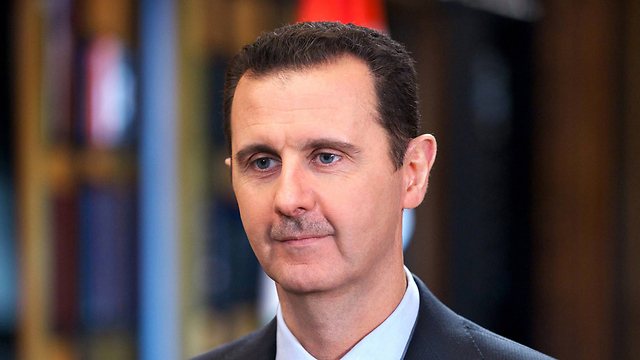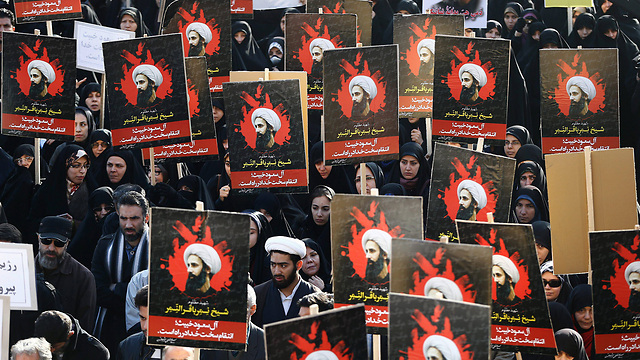
2016 will be the year ISIS' fate will be determined
Analysis: The 'intifada of knives' is going nowhere, Hamas is under siege, Hezbollah is deep in the Syrian war, Assad's army is tiring in fight against rebels, Saudi and Iran are cutting ties, and ISIS is still far from Israel's border. The internal conflicts in the Arab world neutralize the threat to Israel, but it's still considered 'the enemy of Arabs.'
What can we expect from the year 2016 in the Middle East? 2015 was a transitional year, meaning there have been no immediate or dramatic changes: Bashar Assad's regime in Syria once again survived its own downfall thanks to Russia coming to its aid. The Islamic State group suffered great losses and a significant dwindling of manpower and income sources, but was able to retain most of its territories. Saudi's war against the Shi'ites in Yemen has not reached any decisive point, but the Shi'ite Houthis are withdrawing from Aden and the southeast part of the country. The war in Libya also continues, with neither side being able to claim victory, but the jihadists increased their area of control in the north and are drawing near Libya's oil crescent.
The Arab world would be all too happy to forget 2015, a year in which tens of thousands of civilians died in bombings, civil wars, and terror attacks all over the Middle East. What kind of year would 2016 be in the Middle East? How will these threats affect Israel?
Significant escalation in Sunni-Shi'ite conflict
In the first year of his reign, Saudi King Salman bin Abdulaziz Al Saud has turned into the leader of the Sunni fight against the Shi'ite axis. The year 2016 began with the execution of a Shi'ite leader in Saudi Arabia, Sheikh Nimr al-Nimr. The reaction in Iran was the burning down of the Saudi embassy in Tehran by protesters. In retaliation, Saudi bombed Iran's embassy in Yemen.
In 2015, Saudi escalated its economic war by producing massive amounts of oil and lowering the price per barrel, which seriously hurt the economies of Iran and its ally Russia.
The Saudi move to cut ties with Iran snowballed. Following the burning of the Saudi embassy in Iran, countries loyal to Saudi also cut their ties with Tehran.
In Africa, Djibouti and Sudan, both geographically close to Saudi and located on the route of oil ships in the Red Sea. It's safe to assume that in making such a move, the two nations hoped for economic support from the Arab oil superpower.
Among the Gulf States, Bahrain, the most loyal to Saudi, was also quick to cut its ties with Iran, with whom it has an ongoing conflict. The Sunni minority regime in Bahrain (Al Khalifa) accused Iran in the past of taking advantage of the "Arab Spring" to encourage Shi'ite rioting in the country, and recently pointed the finger at Tehran as the one arming terrorists in the small kingdom.
Kuwait, Qatar and Jordan all summoned the Iranian ambassadors in their countries, and Kuwait also recently decided to execute Shi'ite "traitors" who were spying for Iran and had ties to Hezbollah.
The Arab League also issued a strong condemnation of the burning of the Saudi embassy in Tehran.

There's no doubt that the cutting of ties between the leaders of the Sunni and Shi'ite axes will lower the chances of a resolution or a peace accord in Yemen and Syria this year. The Syrian regime will try to take advantage of the Russian presence to make as many military and strategic gains as possible, while Saudi will try to reach a resolution in Yemen this year. However, the Sunni rebels in Syria are showing a lot of determination in their fighting, while in Yemen the Houthis' withdrawal is a slow one, and they are still fighting back.
The year 2016 also opened with a strategic Saudi-Turkish agreement, whose details are not yet known. It appears Saudi is trying to unite the Sunni countries against Iran. To that end, the kingdom is trying to reconcile two of its allies - Egypt and Turkish.
ISIS in retreat
The best news for the new year is the first stages of the Islamic State's retreat, a process that has only begun in recent months. Leading up to the end of 2015, the Iraqi army succeeded, with the aid of American airstrikes, to take back Tikrit, as well as Ramadi, the largest city in the Anbar Governorate.
The Kurdish militia succeeded in capturing from ISIS the city of Sinjar in Iraq and Kobani in Syria, as well as Tel Abyad near the Turkish border and, recently, the strategic Tishrin Dam near Aleppo.
Two major campaigns are expected in 2016 that would determine the Islamic State's fate - the battles for its two capitals, Mosul in Iraq and Al-Raqqah in Syria. Since ISIS is still very strong, the preparations for these battles will take a long time.
In recent months, there has also been a significant turning point with regards to ISIS' sources of funding, with frequent bombings of the oil fields under its control, which provide the organization with about half of its income, and the recent attacks on its "cash banks." Some of the richest oil fields, like in Baiji, were recaptured by the Iraqi army.
Preparing an alternative in Libya?
It appears ISIS is making up for its losses with international terror attacks and by expanding beyond the "Islamic State" territories, mostly in Libya, Yemen, Afghanistan and northern African countries.
Libya, where there is anarchy of tribal wars, appears to be a possible alternative if the organization suffers significant losses in Syria and Iraq. The proximity of ISIS-Libya to Europe and the fact it is surrounded by deserts allow for the supply of arms and the arrival of more recruits.
The organization is currently in control of several cities in the country, including Darnah and Sirte, and is circling the Libyan oil crescent. It will be much easier for ISIS to stage terror attacks in Europe if it establishes an Islamic Emirate in Libya, which is located close to Italy.
The future of the 'intifada of knives'
The end of the current wave of Palestinian stabbing attacks is still not in sight, but it does not pose an existential threat to Israel. The fact Israeli Arabs have joined the violence is particularly concerning, but it is still the domain of a small minority. The chances of this wave of terror turning into a full-fledged intifada like the 1987 or 2000 ones are slim because of the division among the Palestinian factions.
Palestinian President Mahmoud Abbas is afraid Hamas will try to take advantage of the wave of violence to take over the West Bank, which is why he has no interest in further escalation. Hamas is interested in resuming the fighting, but not at present when it is in the midst of a serious crisis.
Hamas is suffering under the onus of a political-economic clampdown: Iran is still punishing it for betraying the Assad regime and joining the Sunni rebels, the money Qatar promised Gaza is not coming, perhaps because of a Saudi veto, and Egypt is fighting the Muslim Brotherhood and flooding the smuggling tunnels between the Strip and Sinai with water. Israel is imposing a blockade on the Gaza Strip. Saudi efforts to reconcile Turkey and Egypt, and Israel and Turkey's normalization efforts, also do not bode well for Hamas.
The Mukauma (resistance) axis in crisis
As we've already established, 2016 began with a series of political moves by Sunni countries opposing Iran. Iran saw its opponents, who had previously been divided, establish closer ties. The war in Yemen is a Saudi message to Iran that it would not be allowed a foothold in the Arab peninsula.
On the strategic level, the Iran-Iraq-Syria-Hezbollah Shi'ite "resistance axis" fell into crisis in 2015. The Russian intervention in Syria shows that the government in Damascus was on the brink of collapse and that Iran and Hezbollah's aid was not enough. In Yemen, the Houthis, Iran's allies, are in retreat. Only in Iraq did the Shi'ite militias, who aided the Iraqi military in the fight against ISIS, managed some achievements. This success, however, is mostly credited to American aerial assistance.
The war in Syria resulted in many Hezbollah casualties. The assassinations of Jihad Mughniyeh, the son of assassinated Hezbollah leader Imad Mughniyeh, and Samir Kuntar in late 2015 (which was attributed to Israel) were hard blows for the Lebanese terror organization. The message seems clear: Israel will not allow the "Mukauma" to open an active front in the Golan Heights.
A year of crisis for Iran?
Iran needs to get past the hurdle of the February elections to parliament, which is comprised of the Islamic Consultative Assembly and the Assembly of Experts, while facing the threat of renewed rioting. For the first time, the two bodies will hold elections at the same time. The reformists in the country have marked December 30 as the Remembrance Day for those killed in the 2009 protests that followed the controversial, rigged elections. Tehran's senior religious speaker warned of riots organized by the reformists, who are, according to him, "even more dangerous to the state than the Iran-Iraq war."
Despite the lifting of sanctions following the implementation of the nuclear deal with world powers, it will take a lot of time to improve Iran's economy, as Iranian President Hassan Rouhani has promised. A sluggish progression of the Iranian economy might disappoint many youths and encourage protests against the regime.
The deteriorating health of Supreme Leader Ayatollah Ali Khamenei could also impact Iran's policies this year. According to several reports, the fight over who would succeed him has already begun, and the extremist faction of the Revolutionary Guard and Basij Militia have a political and military advantage over their opponents in the "moderate" camp (which include Rouhani and former presidents Mohammad Khatami and Akbar Hashemi Rafsanjani). The latest provocations by the Revolutionary Guard against the American Navy show the more extremist camp's opposition to the nuclear deal, and its ambitions to prevent the postponement of the nuclear project by ten years, as the nuclear deal signed in the summer of 2015 with the six world powers dictated. Internal conflicts within Iran will affect the nuclear threat to the Sunni world and to Israel.
Egypt – fighting terror and poverty
Egypt, led by President Abdel Fattah al-Sisi, has been successfully preserving political stability for two and a half years, which is twice the amount of time the Muslim Brotherhood, led by Mohammed Morsi, was in power. Despite the terror attacks in the country and the ISIS activity in the Sinai, the government's hold on power is strong, thanks to the military's allegiance to the president, who came from their ranks. The parliamentary elections went well, but the turnout was very low. Guaranteeing long-term stability mainly depends on improving the material status of the civilian populace.
The Egyptian economy has recently suffered a severe blow because of the downing of the Russian plane in the Sinai. Tourism is one of the most important fields in the Egyptian economy. The expansion of the Suez Canal, which cost a fortune, hasn't produced the desired rewards as of yet either.
The Gulf States and Saudi Arabia are supplying Egypt with an economic life raft in these tough times. However, the road to stabilizing the Egyptian economy, which has been crumbling since the January 2011 revolution that toppled the regime of President Hosni Mubarak, is still long. A successful war on terror is expected to bring back tourists. The Egyptians fighting terrorism in the Sinai and closing the border with the Gaza Strip are also important to Israel's security.
The Syrian civil war enters its fifth year
The airstrikes by the Russian military have brought about the deaths of thousands of civilians, and few changes to the balance of power in Syria at this point. The assassination of Islamic Army leader Zahran Alloush approximately two weeks ago by a Russian plane was a hard blow to Saudi Arabia's supporters among the Syrian rebels. The Russian bombings allow the regime's forces to go from defense to offense, and it has begun retaking several suburban territories near the cities of Lattakia, Hama, and Aleppo.
In other territories, such as southern Damascus, jihadist rebel forces have cleared out following an agreement reached thanks to UN mediation. It's safe to assume that the tired Assad military will not manage in 2016 to retake the territories it lost in the past five years, but the Russian aid will help it strengthen its grasp of the territories it holds now.
The moderate rebels still control the south, which borders Israel and Jordan. The rebels in this area are given aid in the form of arms and funds from Saudi Arabia and the Gulf States. A small ISIS cell, Shuhada al-Yarmouk (the Yarmouk Martyrs Brigade), isn't far from the border at the Golan Heights, but is constantly busy fighting other factions of rebels.
What does it all mean for Israel?
The internal conflicts in the Muslim world are neutralizing the threats to Israel:
The "intifada of knives" is going nowhere, Hamas is under an economic and diplomatic siege, the Syrian army is being worn down by the fight against the rebels, ISIS in the Sinai is struggling to survive against Egypt, the rest of the Islamic State's terrorists are still far away, and in order to reach Israel's borders the organization must pass through its many rivals – the Sunni rebel forces, Hezbollah, and the Russian-backed Syrian Army. The borders are quiet for now, Jordan and Egypt are maintaining stability, the Lebanese military is avoiding conflict, and the rebels on the Syrian border are busy fighting Assad's forces.
As of 2016, the Sunni Arab world's main enemies are ISIS and Iran, but that doesn’t mean that Israel has ceased being an enemy. Recently, one of Egypt's TV channels, Al-Khamis, conducted a poll among people of different ages. They were asked, "Is Israel still the enemy?" All of them answered in the affirmative.
 |













